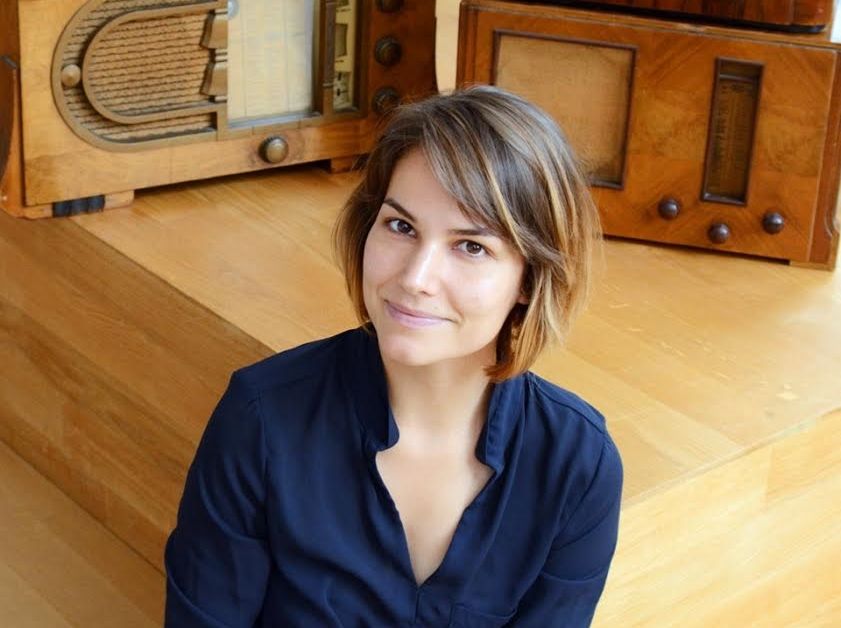
Helena de Groot, one of the producers of The Paris Review Podcast Season 2, is a freelance audio producer whose credits include the Poetry Foundation and, of course, The Paris Review. Originally from Belgium and now based in New York, she answered some questions from our social media manager, Rhian Sasseen, on the relationship between listening and reading, non-anglophone radio, and the art of the podcast.
INTERVIEWER
Listening to you coax performances out of the podcast’s featured readers, both professional actors and amateurs, was fascinating to experience. What do you think is the role of performance in literature and writing?
DE GROOT
It’s harder to lie or pretend with just a voice—there are no wigs or costumes or makeup to help the performance along. The emotions, often a complex tangle of them, say happiness and envy tinged with foreboding, have to be real. So while we were recording these pieces for The Paris Review Podcast, the sessions often became a cross between literary analysis and therapy. What do you think is going on in this sudden stream of consciousness? Do you think the narrator here is ashamed of himself? Have you ever had a conversation like that with your own daughter? And so on. It was incredible to witness how multilayered and alive the text became once it struck a personal chord in the performer.
What do I think is the role of performance in literature and writing? I’m not sure. Not every text is meant to be performed, of course, and ever since human beings discovered they could read in silence, writers have written for that quiet cathedral inside our skull. I’m not even sure I like audiobooks all that much. If they sound too performed, or canned, I can’t stand them.
INTERVIEWER
What’s your process when it comes to directing and recording performers?
DE GROOT
It’s such an interesting process to be a part of … Sometimes, someone telling you a story or reading you a poem can hit so viscerally. To give you an example, I had read Sarah Manguso’s essay “Oceans” when it first came out in the magazine, in the spring of 2019, and I was blown away by the way in which she interwove ocean mythology with ideas about boundlessness and death and her own experience with cancer, seemingly without changing tone or losing her cool. But when she came into the studio and read about getting the diagnosis, thinking of her reckless behavior in the past and how much she wanted to be alive for her son, her voice took on a grim, cheery bravery that I felt deep in my bones. It’s hard to predict those moments. But when they happen, I’m glad to be alive.
INTERVIEWER
What was your favorite moment while recording The Paris Review’s podcast?
DE GROOT
My favorite moment was Quincy Tyler Bernstine reading Lucille Clifton’s poem “lorena.” Quincy is a stage actress, lauded for playing the title role in the recent Lincoln Center show Marys Seacole. To record “lorena,” I sat on the floor next to her chair in the living room, holding up a mic, and gave her no more than a few words of backstory for each take. You are sitting in the car, all alone, head spinning, half-delirious with guilt for having cut off your husband’s penis. He spent over a decade mocking and berating you, he’s been violent, he’s threatened to kill you, and now you finally had enough. You are steely and composed, you have never been more in control, you will not let this piece of meat bloody your dress.
With each take, Quincy would take a breath, pause a beat, take on the posture, gesticulation, facial expression, and tone of a new person, and launch into the poem, seemingly without glancing at the page in her hand. It was almost uncanny, how she could make a quick sketch into a flesh-and-blood human being.
INTERVIEWER
You’re not originally from the United States. How does the podcast scene in other countries compare to that of the U.S.?
DE GROOT
I’m from Belgium, which has two podcast scenes, one in Dutch—Flemish—and one in French. It’s probably a bit different for French speakers, but if you’re a Dutch speaker, as I am, you have one big problem, which is that there simply aren’t enough Dutch speakers to make a living in podcasting. So people teach, wait tables, clean houses, drive a taxi, or paint houses, which frees them up to make exactly the oddball poetic sound-rich soul stirrers they want to make. I’m lucky to know some of them, and I’m always in awe, and of course a bit jealous, when I hear the sheer brilliance they spent months or sometimes an entire year creating.
But I don’t want to romanticize it. As almost every artist in America knows, it’s a huge bummer to have to live most of your life doing something you don’t necessarily care for and then spend evenings and weekends sequestered in your room with your big idea.